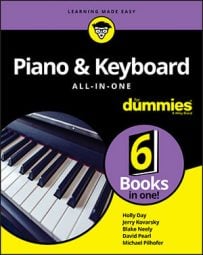Nothing teaches music better than playing music. After a while, you may feel in the mood for collaboration. Lucky for you, the concept of piano duets, ensembles, and bands came along. In any city, college, or university, and even most small towns, you can easily find other musicians who simply love to play together.
Piano duets
Find a friend, sibling, parent, or teacher to share the piano bench with you and play the lower or upper part of a duet. Many songs are available in duet form, where each player gets his or her own printed music showing which part of the piano to play. But playing a duet is not a race; you start, stop, and play the song together.
When you find somebody to play duets with, look into the wealth of music published for piano duets. The duet repertoire includes everything from Beethoven, Tchaikovsky, Schubert, and Stravinsky to folk music and popular songs. There are arrangements of ballet scores and symphonies as well as music for piano players of all levels.
Chamber groups
Many ensembles require a pianist. In the world of classical music, a piano trio features a piano and two other instruments — typically a violin and a cello. In the world of jazz, a quartet may include a piano, drums, bass, and saxophone. Find friends who need a third or fourth wheel and climb onboard.
Virtually every major composer has written specifically for trios, quartets, and other size ensembles, so the repertoire of pieces you and your friends can play is endless.
Bands
With you on keyboard, all you need is a drummer, bassist, guitarist, and maybe a singer, and you've got yourself a band. Whether you're just having fun in the garage or actually pursuing gigs, playing in a band can be incredibly fun and rewarding. Craigslist is a great place to start looking for people who want a keyboard player. Or check out the bulletin board fliers often found at local music stores. Or heck, place your own ad!
Everyone in a band should be more or less on an equal playing field. Having band members with similar playing proficiency as you (not much better or much worse) helps to keep those intra-band rivalries to a minimum.
As you and your band or ensemble improve, invite friends to come hear you practice. Play songs that your audience wants to hear, or make up your own. When you're convinced that you're really good, solicit interest from local venues — bars, restaurants, hotels, bridge clubs, weddings — and play for a bigger crowd. Create a band website and get your music up online. Put your music on a music-hosting website like Soundcloud. A hobby can easily become a career if you work at it hard enough.

